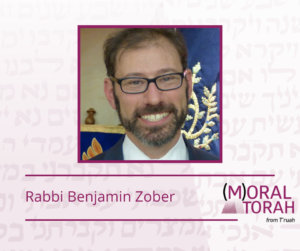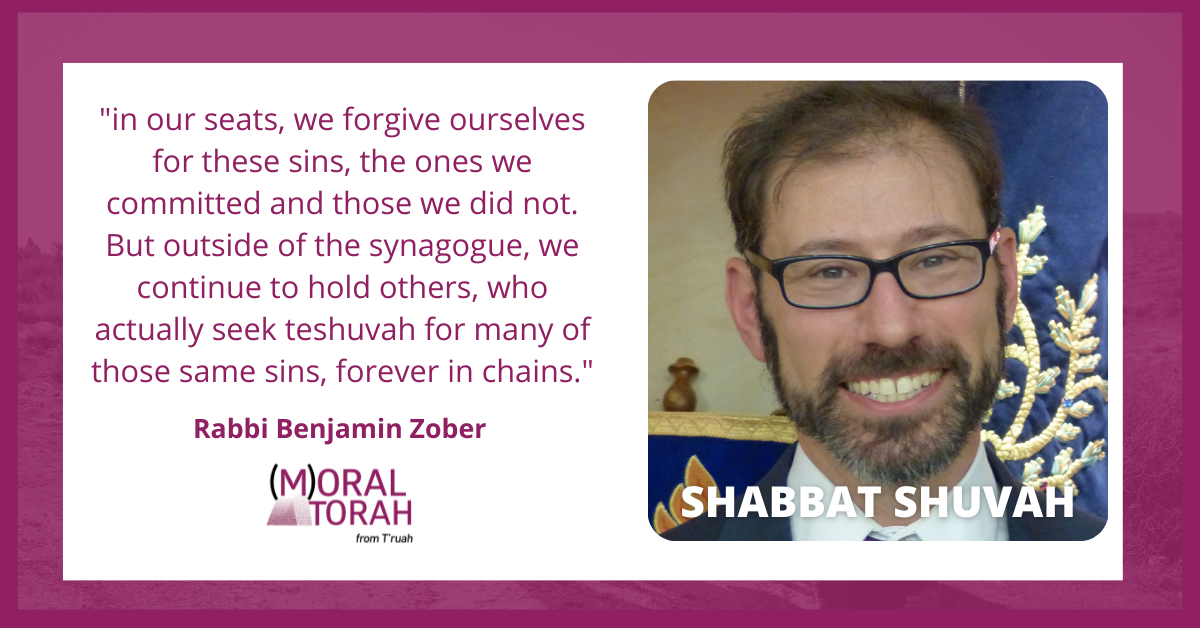A D’var Torah for Shabbat Shuvah by Rabbi Benjamin Zober
Imagine aliens do exist, and they send a team to Earth. And then we kill them.
This could be quite an interplanetary diplomatic disaster, but when it happened on an episode of the 1960s television show “The Outer Limits,” it turned out differently. The human characters learned that these beings could not kill their own, so they sent them to the “practiced executioners” of Earth. They knew exactly what we would do.
We excel at punishment. We have punished ourselves, our fellow humans, even the Earth. Where we need practice is in accepting teshuvah, return. As we observe this Shabbat known as Shabbat Shuvah, or the Shabbat of Return, we must confront how we treat those in need of return.
Sign up to receive (M)oral Torah in your inbox each week.
Our punishments are often unending. We sentence people to death – a ghastly and irreversible sanction, allegedly reserved for the “worst of the worst” but mainly borne by the poorest and most disenfranchised. No matter that many innocent people sit on death row. No matter that many more have done what we know as teshuvah – we do not let them return. There is no return from a death sentence. We do not allow or care for teshuvah.
While those who pay the ultimate price are denied the fulfillment of their teshuvah, many more who have lesser sentences are also stymied, innocent and guilty alike. For those who do the work and are to be set free, we still do not release them. We continue to punish for crimes long after the sentence ends. We deny people the right to vote, the privacy and promise of a new life, and ensure that people who have made mistakes continue to suffer for them. Every sentence is a life sentence when we do not allow people to be freed. There is no teshuvah when we do not let people return.
On Yom Kippur, we symbolically punish ourselves. We list sins and beat our breasts, even if we ourselves did not do everything mentioned. And in our seats, we forgive ourselves for these sins, the ones we committed and those we did not. But outside of the synagogue, we continue to hold others, who actually seek teshuvah for many of those same sins, forever in chains. Endless, unforgiving punishment does not comport with the values we aspire to on Yom Kippur.
Find more commentaries on Shabbat Shuvah.
We face the idea of endless punishment this Shabbat Shuvah, as we read Parshat Vayeilech. In it, we are reminded that for Moses there is no teshuvah. His angry, impetuous, faithless sin of striking the rock will not be forgiven. His punishment is not that he is kept in, but kept out – of Israel. We read this and consider the unfairness, the injustice that his one act will not be forgiven, that he cannot make teshuvah. It resounds as one of the most unfair moments in the Torah. As we confront it during this season, let it remind us of the unfairness we inflict on those whom we keep unforgiven.
Even as the gates of repentance truly never close, our opportunities to free others are not limited to once a year. In our daily liturgy, we are reminded again and again that people err, people make mistakes, people fall. In reciting the Amidah, we pray to God who ”supports those who fall, heals the ill, frees the imprisoned, and keeps faith with those who sleep in the dust…” We close that prayer: Blessed are you Adonai, who revives the dead. Rabbi Roni Handler teaches that this is a recognition of return – that to be sick, to be downtrodden, and to be imprisoned is like death. It is a recognition that all are conditions from which we can return. And we can allow people to return. As attorney and author Bryan Stevenson wrote, “I believe that each person is more than the worst thing they’ve ever done.” Moses is denied the realization of his life’s work because of one thing that he did. We feel his isolation and know how haunting it is for something we have done to be considered beyond teshuvah, beyond help.
Teshuvah must always be possible.  “Rabbi Meir would say: Great is teshuvah, for if even one individual [truly] accomplishes it, [the heavens] forgive the entire world.” (Talmud, Yoma 86b) One person atones, and we are all forgiven by God. And yet we, as humans, struggle to forgive other people.
“Rabbi Meir would say: Great is teshuvah, for if even one individual [truly] accomplishes it, [the heavens] forgive the entire world.” (Talmud, Yoma 86b) One person atones, and we are all forgiven by God. And yet we, as humans, struggle to forgive other people.
We are well-enough practiced in punishment. Now it is time to practice return. If we are to heal the world, ourselves included, we must honor teshuvah, and let those who seek it return to life and to peace.
Rabbi Benjamin Zober is a criminal justice reform advocate and former death row attorney. He is the co-rabbi of Temple Sinai in Reno, NV, with his wife, Rabbi Sara Zober.

